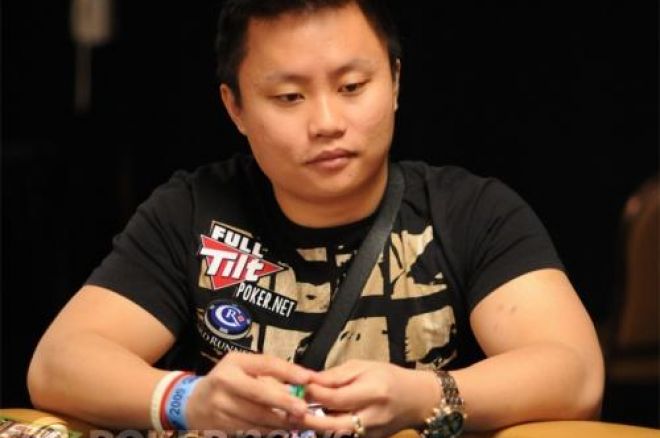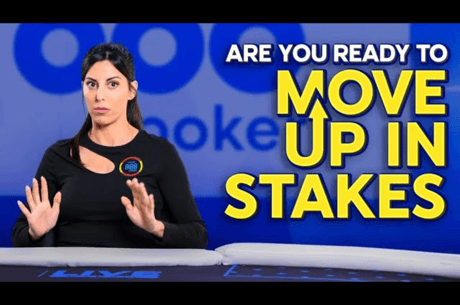Bluffing in Heads-Up Cash Games with Eric Liu

Eric Liu is a high-stakes cash-game regular with tournament results to boot. While his screen name ��p3achy_keen�� may not illicit fear from the untrained eye, his cunning skill and ability to prey on weakness surely will from any heads up opponent, which brings us to this week��s concept: bluffing in heads-up cash games.
Let��s start out by talking about one particular bluff you pulled while playing heads up againstIlari ��Ziigmund�� Sahamies. Leading up to the hand we��re about to talk about, how was the match going?
We were both playing pretty solidly at the time. He was sitting with $140,000. He��d stacked me a few times, but I had chipped up a little, so in his mind, I��ve calmed a little and back in the zone, playing a little more solidly. I��m stuck, but I��m not really tilting because I have built back more of a stack. At this point, I would assume that my image to him is that I��m playing pretty solid and not bluffing too much or getting out of line.
The Hand: Preflop: Ziigmund raises to $1,200. Liu reraises to $4,000 with Q?J? and Zigmund calls. The pot is now $8,000.
Against a player like Ziigmund who raises the button a ton and calls reraises, are you three-betting him with a hand like this for value?
Yeah, against a player like Ziigmund who raises on the button a ton like any good player does, I like to reraise with hands that flop very well like queen-jack of diamonds. The way the session was going, he wasn��t four-betting much, so I wasn��t really risking getting four-bet off my hand. This hand dominates a lot of his calling range like queen-ten, jack-ten, stuff like that.
The Hand: Flop: The flop is A?K?9? and Liu bets $5,800. Zigmund calls, and the pot is now $19,600.
Obviously, you flop a great draw. What goes into your thought process for betting here?
Well, this kind of flop, if you think about it, should hit my three-betting range. Obviously I��m three-betting hands like ace-king, ace-queen, and ace-jack sometimes, and a lot of premium hands that smack the flop. Now, I don��t have any of those hands, but I do have an extremely strong hand with my draw. So my thought process is that I definitely have to bet here, and he��s going to fold a good portion of the time.
What kind of hand are you putting him on when he just calls?
When he calls me on the flop, I think he could have any ace or any king. He could be floating with queen-ten or jack-ten. He could even call with a nine. Also, the interesting thing is that he could have a diamond draw because on this type of flop he��s never raising. A lot of times he��d raise on flush a draw, but on this board, when he raises, he can��t represent anything but a draw. So when he just calls, I think he could have a draw also.
Is the reason he can��t represent anything but a draw because he didn��t four-bet preflop?
Exactly, so he can��t really have ace-king, aces, or kings, which is pretty much all he��s representing when he raises me on the flop. He could, sort of, go to the next level and raise with ace-ten and call off the rest of his stack, but I didn��t think he��d do that in this particular spot since he was up so much.
The Hand: Turn: The turn is the 7?. The board now reads A?K?9?7? and Liu bets $16,800 and Ziigmund calls. The pot is now $53,200.
What is your plan on the turn?
When I bet this turn, I��m already planning to shove the river if he calls me. I feel like, when I bet the turn, and if he calls me, he��s probably not expecting me to shove the river as a bluff because it would be such a suicidal bluff. There are two draws out there and shoving just looks like it has very little fold equity against a player like Ziigmund, who we all know can be out of line and make a lot of thin calls. So, I bet pretty big, trying to make sure he didn��t do anything stupid against me like make a weird raise and get me off the hand. At this point, obviously I��m putting him on the same range as I put him on, on the flop. I figure he��s folding some of that range and calling with a ton of it too. Obviously he��s folding a nine, and he��s folding a king sometimes, but he��s not going to fold an ace or a flush draw because we are pretty deep.
Would you have folded if he shoved over your bet on the turn?
I think I would have probably folded because I bet pretty big, so it looks like he can��t get me off a hand. If he shoves, that means he has a legit hand.
The Hand: River: The river is the 8?. The board now reads A?K?9?7?8?. Liu goes all in for $28,399. Ziigmund folds. Liu shows Q?J?.
What made you inclined to bluff here even though a lot of times it might be suicide?
There was as lot going into it. Throughout the entire session, I hadn��t shown down any bluffs. I hadn��t three-barreled him at all. The most I��d ever done was launch one barrel in three-bet pots, given up, then checked down or checked the flop, then given up. This is the first time I��d made a bluff like this, and I think it��s as good a spot as any. He��s definitely folding a king and all draws. I feel like, once I��m shoving there, he could even be folding a lot of weak aces, thinking that I could shove ace-king, ace-queen, or ace-jack.
Why did you decide to show?
Honestly, I don��t think it��s such a good idea to show (laughs) Ziigmund and I used to have this weird dynamic. We were really competitive against each other. He would slow roll me, and I would bluff and show a lot. I would not recommend that though. It��s not a good strategic move.
Since bluffing is essential in heads-up play, how do you generally analyze different opponents to know when you can and can��t bluff?
Obviously, against any opponent, you want to get away with as much as possible but without exploiting it so much that they realize it. For example, if you��re three-betting every single hand, that��s not profitable because they��re going to start four-betting, but if you��re three-betting with a decent range and mixing in some three-bet bluffs in there, and they��re folding a lot, you can start mixing in more and more three-bet bluffs until they finally realizes and fight back. You really have to keep in mind your frequencies like how often you are two-barreling on certain board textures, how often you��re c-betting, and how often they��re fighting back against what you��re doing. Then, you have to adjust.
So do you find that players are often bluffing in the wrong spots?
I feel like a lot of times people tilt and, therefore, not think things through. Yeah, people are not bluffing in the right spots. It��s definitely hard to figure out what the right spots are though because two identical-looking spots can be both extremely good or extremely bad, depending on the mindset of your opponent and what they��re perceiving to be the case at the time. That��s why bluffing is such a unique thing. Every spot that you��re pulling off a bluff is going to be unique to that situation because of the history and mindset of both of you at that time.
This bluff was really a value-bet bluff. With these kinds of bluffs, it seems like history and game dynamic are essential in order to execute one successfully, because of the odds the opponent is getting to call.
You really have to know you��re opponent to get away with it, but of course, if you don��t know you��re opponent yet, you can just do it, and if they call, they��re going to have a perception about you and when you bet small. Then you can adjust, and value bet small.
Work on your game. Sign up for an online poker account today.








